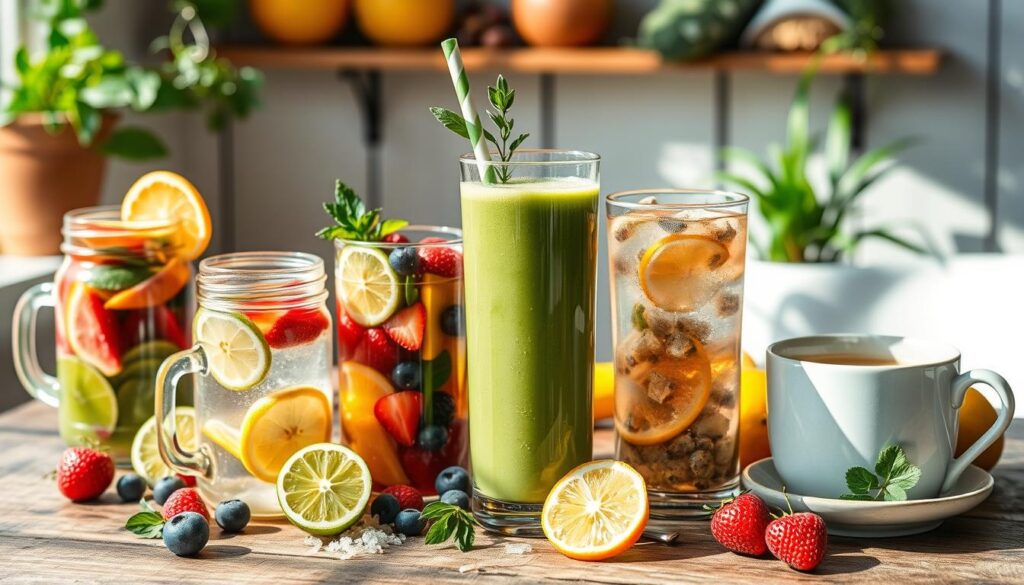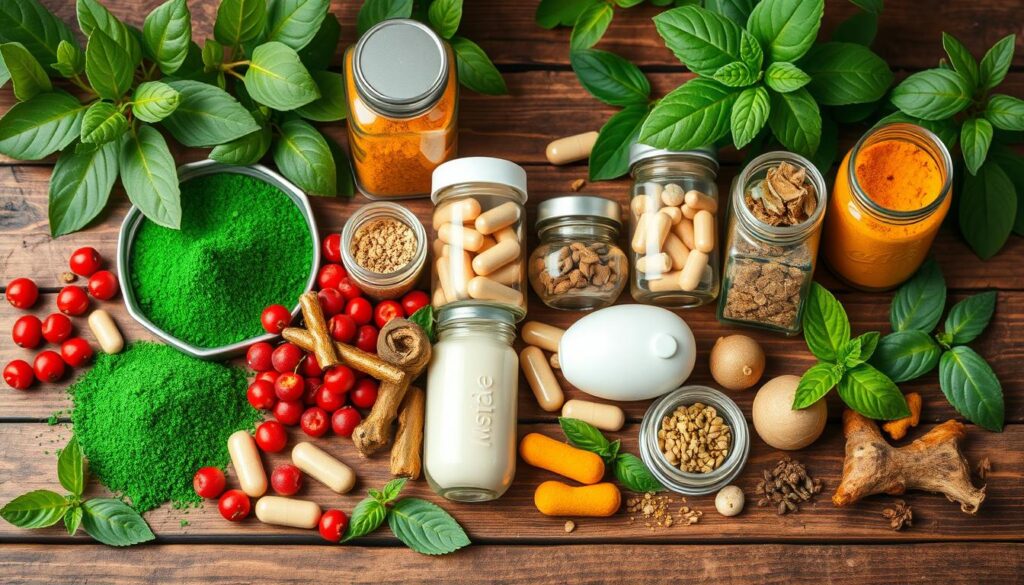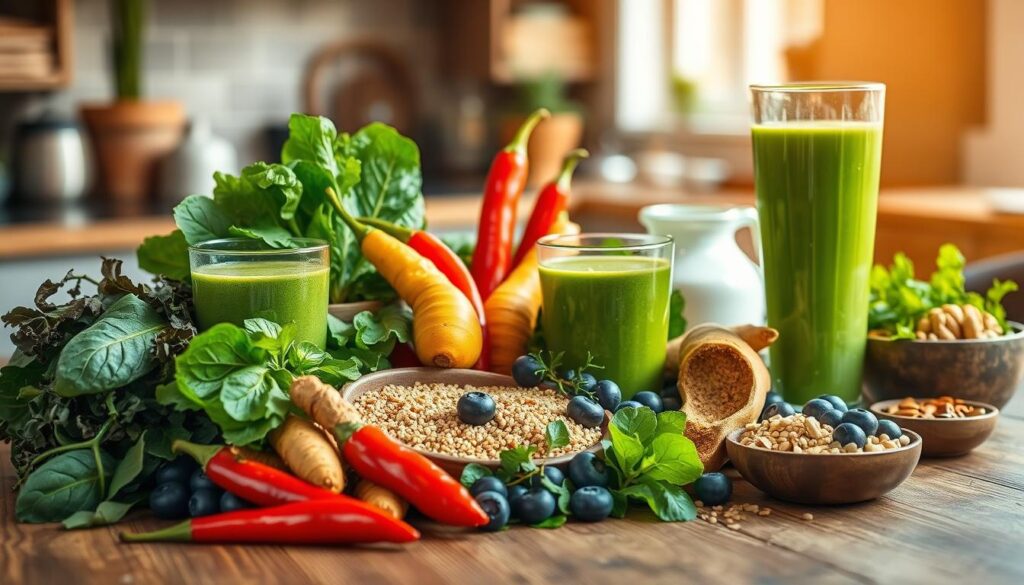Metabolism is how your body turns food into energy. When it works well, you have more energy and manage weight better. You also feel more alive. The best part is, you can help your metabolism with the food you eat.
Some foods can really help boost your metabolism. They are full of nutrients and can make you feel more energetic. Foods like protein, spices, and superfoods are great for your body. Adding them to your diet can make you feel your best.
Key Takeaways
- Certain foods can naturally help boost your metabolism for increased energy and weight management
- Protein-rich foods, like lean meats, fish, and legumes, are essential for supporting a healthy metabolism
- Spices and herbs with thermogenic properties, such as chili peppers and ginger, can help burn more calories
- Nutrient-dense superfoods, including leafy greens and berries, provide antioxidants and other compounds that support metabolic function
- Staying hydrated with water can briefly increase your metabolic rate and aid in overall health
Understanding Metabolism: How Your Body Burns Energy
Metabolism is a complex series of chemical reactions. It turns the food you eat into energy for your body. This process involves many factors that affect your health and well-being.
The Science Behind Metabolic Rate
Your metabolic rate, or basal metabolic rate (BMR), shows how many calories you burn at rest. This includes breathing, circulation, and cell repair. About 60%-70% of your body’s energy goes to your BMR.
Factors Affecting Metabolism
Many things can change your metabolic rate. These include your age, gender, body composition, and genetics. As you get older, your metabolic rate slows down. Men usually have a higher rate than women because they have more muscle.
Muscle burns more calories than fat, even when you’re not moving.
Role of Diet in Metabolic Health
Your diet is key to a healthy metabolism. Eating a metabolism boosting diet with protein-rich and fiber-rich foods helps keep your rate steady. Adding calorie burning foods and nutrient-dense foods to your meals boosts your body’s energy use.
Knowing how metabolism works and what affects it helps you make better choices. This supports your metabolic health and overall well-being.
Protein-Rich Foods: The Foundation of Metabolic Health
Protein-rich foods are key to boosting your metabolism. They help build and repair muscles. They also help your body burn more calories.
The body works harder to digest protein than fats or carbs. This is called the thermic effect of food. It means you burn more calories all day long.
Good sources of protein are lean meats like chicken, turkey, and fish. Also, eggs and dairy products are great. For plant-based diets, lentils, chickpeas, and black beans are excellent choices.
Eating protein at every meal keeps your metabolism going. Whether it’s breakfast, lunch, or dinner, protein helps. It gives your body what it needs to stay high metabolism and metabolic boosting.
| Protein-Rich Food | Metabolism-Boosting Benefits |
|---|---|
| Chicken | High in protein, low in fat, and requires more energy to digest, helping to increase calorie burn. |
| Eggs | Provide high-quality protein and contain choline, which supports liver function and fat metabolism. |
| Lentils | Rich in fiber and plant-based protein, contributing to feelings of fullness and stable blood sugar levels. |
| Cottage Cheese | High in protein and calcium, which are important for maintaining muscle mass and supporting metabolic processes. |
A balanced diet with high metabolism foods and metabolic boosting foods is essential. Eating protein-rich foods fuels your body. It keeps your thermogenic processes strong.
food for boost metabolism: Essential Nutrients and Components
Boosting your metabolism is easy with the right foods. Some foods have special nutrients that make your body burn more calories. This can make your metabolism work better.
Thermogenic Properties of Foods
Spicy foods like chili peppers can help your metabolism. They have a compound called capsaicin. It can burn an extra 10 calories per meal. Ginger and green tea extract also raise your body’s temperature and help burn fat.
Nutrient Timing and Metabolism
Eating small meals often can keep your metabolism going. Eating 29% of your daily calories as protein can make your metabolism faster. Foods high in protein, like lean meats and legumes, are good for your metabolism.
Portion Control for Optimal Results
Even healthy foods can lead to weight gain if eaten too much. It’s important to eat the right amount. Eating metabolism-boosting foods like nuts and leafy greens in the right amounts helps your metabolism work best.
| Nutrient-Dense Metabolism Boosters | Potential Benefits |
|---|---|
| Spicy chili peppers (capsaicin) | Modestly increase metabolic rate and contribute to weight management |
| Ginger | Increase body temperature and metabolic rate, aiding weight loss and improving metabolic profiles |
| Green tea extract | Increase fat metabolism at rest and during exercise |
| Protein-rich foods | Higher metabolic rate compared to lower-protein diets |
| Leafy greens and cruciferous vegetables | Metabolism-enhancing effects due to various nutrients and compounds |
Knowing about thermogenic foods, nutrient timing, and portion control helps. You can make a diet plan that boosts your metabolism. This supports your health and well-being.
Spices and Herbs That Rev Up Your Metabolism
Boosting your metabolism doesn’t need hard workouts or strict diets. Some spices and herbs can help naturally. Adding these to your meals makes food taste great and helps burn calories.
Cayenne pepper is famous for its thermogenic effects. It has capsaicin, which boosts your metabolic rate and burns fat. Just a little cayenne in your dishes can help your metabolism.
Ginger is also great for your metabolism. It helps with digestion and boosts your metabolic rate. Add fresh ginger to smoothies, teas, or baked goods for a tasty metabolic boost.
Turmeric is another powerful spice. It has curcumin, which fights inflammation and supports metabolism. Use turmeric in curries, rice, or on roasted veggies for a flavorful metabolism boost.
“Spices don’t just add flavor – they can also be powerful tools for maintaining a healthy metabolism.” – Registered Dietitian, Sarah Johnson
Using spices and herbs can make your meals healthier and tastier. Get creative in the kitchen. Let these natural enhancers make your food delicious and metabolism-boosting.
Power-Packed Superfoods for Enhanced Energy
Adding superfoods to your diet boosts your metabolism and energy. These foods are full of vitamins, minerals, and antioxidants. They help your body burn calories and stay energized all day.
Leafy Greens and Cruciferous Vegetables
Spinach, kale, and Swiss chard are full of magnesium. This mineral is key for energy and metabolism. Broccoli, Brussels sprouts, and cauliflower are also great. They have fiber and plant compounds that help with blood sugar and inflammation.
Berries and Antioxidant-Rich Fruits
Blueberries, raspberries, and other berries are full of antioxidants. These protect your cells and support your metabolism. They also have fiber and natural sugars for energy without blood sugar spikes.
Healthy Fats and Omega-3 Sources
Healthy fats like those in avocados, nuts, and salmon keep you full. They help prevent overeating and support a healthy metabolism. Omega-3s also help burn fat and reduce inflammation.
Adding these superfoods to your diet boosts your metabolism and energy. Mix different foods to support your health and well-being.
“Eating a diet rich in nutrient-dense, high metabolism foods is one of the best ways to support your body’s natural energy production and fat-burning capabilities.”
Hydration and Metabolism: Essential Beverages
Drinking enough water is key for a healthy metabolism. Even a little dehydration can slow down your metabolism. This makes it harder to lose weight.
Water is the best drink for staying hydrated. It can also help boost your metabolism. Drinking water all day can help you burn more calories.
Some drinks can also help your metabolism. Green tea has antioxidants and catechins that boost your metabolism. Coffee has caffeine, which can help, but drink it in small amounts.
Herbal teas like peppermint and ginger can help with digestion. They also support your metabolic health.
Try adding fruits, herbs, or citrus to your water. These can make drinking water fun. They might also help boost your metabolism.
Staying hydrated is important for a healthy metabolism. It’s also good for your overall health.
“Proper hydration is the foundation for a healthy, metabolism-boosting lifestyle.”

A hydrated body is a healthy body. Add these metabolism-boosting drinks to your daily routine. You’ll see your metabolic rate improve.
Strategic Meal Planning for Metabolic Boost
Planning your meals can really help your metabolism. It’s all about how your body uses energy. Knowing this lets you choose the right foods and when to eat them.
Optimal Meal Timing
Eating at regular times keeps your metabolism going. Some say eating small meals often is good. Others think intermittent fasting works best. Try different ways to see what’s best for you.
Eat every 3-5 hours. This keeps your energy up and stops your metabolism from slowing down.
Food Combinations for Maximum Effect
How you mix foods matters too. Eating protein with carbs helps keep your blood sugar steady. This gives you energy for a long time.
Adding foods that boost your metabolism to every meal is smart. Include lean proteins, veggies, and healthy fats. This helps your metabolism stay healthy.
| Meal Timing Strategies | Optimal Food Combinations |
|---|---|
|
|
Using these meal planning tips can boost your metabolism. You’ll feel more energetic, manage your weight better, and be healthier overall.
Natural Supplements and Metabolism Enhancers
Natural supplements can help boost your metabolism. They work best when you eat well and exercise often. But, they shouldn’t be the only thing you use.
MCT oil, made from coconut oil, might help you burn fat faster.1 Green tea extract, full of good stuff called catechins, can also help you lose fat.2 Caffeine can make you burn fat faster, but use it carefully.
Remember, how well supplements work can vary. Always talk to a doctor before taking them. Eating right is still the best way to keep your metabolism strong.
“Supplements should not replace a healthy, well-balanced diet. They can provide an added boost, but the real foundation for metabolic health lies in the foods you choose to nourish your body.”
Eating lots of healthy foods and staying active is key. This helps your body burn calories well. It also gives you lots of energy.

- A 2015 study found MCT oil can help you burn more fat and energy.3
- Green tea extract might help you lose fat because of its catechins.4
- But too much caffeine can be bad for you.5
Getting healthy is about more than just supplements. It’s about eating right, exercising, and living well. Supplements can help, but they’re not a substitute for good food.
Conclusion
Eating right can help boost your metabolism. You should eat foods rich in protein, spices, and superfoods. Drinking plenty of water and eating well is also important for your health.
But, remember, no diet or supplement can change your metabolism a lot. You need to move, sleep well, and manage stress too. Talking to a doctor or dietitian can help you make a plan that works for you.
Small changes in your life and diet can help your body burn calories better. Use “food for boost metabolism” to feel full of energy all day. Start your journey to a healthier, happier you today.


A Life-Changing Experience with This Weight Loss Supplement (Nagano Tonic)
I’ve always struggled with finding a weight loss solution that actually works for me. Like many, I’ve tried numerous diets, exercise routines, and supplements over the years—some worked for a short time, but nothing ever gave me long-term results. That was until I decided to try the weight loss supplement I found : Link to the Supplement.
From the moment I started using it, I noticed a difference. Not only did I feel more energized, but my cravings also became more manageable. The best part? I started seeing results much quicker than I anticipated! Over the course of just a few weeks, I noticed a significant reduction in belly fat and overall weight loss that I hadn’t been able to achieve before.
What makes this supplement stand out from all the others I’ve tried is how it supports me in my daily routine without any jitters or energy crashes. I’m able to stay focused and motivated, which has made it easier to stay on track with my diet and exercise plan.
This product truly exceeded my expectations, and I feel more confident and healthier than ever before. If you’re struggling with your weight loss journey like I was, I highly recommend giving this supplement a try. It’s been a game-changer for me, and I’m sure it can work wonders for you too!
Contant Them on email .. tonicnagano50@gmail.com